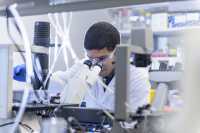02 Feb New Technique Allows Mining of Specific Antibodies From B Cells
MedicalResearch.com Interview with:
Dr. Sarav Rajan, PhD Scientist
Antibody Discovery and Protein Engineering
MedImmune
MedicalResearch.com: What is the background for this study? What are the main findings?
Response: During an infection, B cells (a type of white blood cell) create antibodies against antigens present on a pathogen. These cells can be extremely rare, and finding them among the millions of other cells is extremely challenging.
Existing methods to examine B cells require a trade-off: either capture the full sequence repertoire by next-generation sequencing but functionally screen just a subset, or culture a subset of B cells and fully screen them. Instead, our method captures the complete repertoire within a typical blood draw and screens all its members to identify the rare antigen-positive antibodies. Using a new microfluidic approach, we recovered the antibody genes from one million B cells encapsulated in picoliter-scale droplets, breaking through a widely-published view that amplifying from single cells in such small volumes is inefficient. The resulting library seamlessly integrates into our high-throughput screening infrastructure to enable rapid isolation of desired antibodies. Using this method, we were able to isolate a panel of rare cross-reactive antibodies targeting influenza.
MedicalResearch.com: What should clinicians and patients take away from your report?
Response: Previously used methods for identifying antigen-specific antibodies from primary human B cells are challenging and time consuming. The technology we present is robust and very rapid, as we can progress from blood to antigen-specific monoclonal antibodies in less than 4 weeks. We therefore feel that this work has the potential to accelerate development of biological therapies and vaccines in the future, particularly for rapidly-spreading or emerging infections.
MedicalResearch.com: What recommendations do you have for future research as a result of this study?
Response: We hope the approach will facilitate the mining of natural antibodies from humans in response to disease. By capturing the repertoire in a very stable DNA form, libraries from many individuals can be archived, scaled-up, merged and screened for binding to any number of targets. While we’ve highlighted the application of the technology in infectious disease therapy, it’s known that antibodies are involved in other diseases, including cancer. We are keen to see how such a method could accelerate discovery in these areas.
MedicalResearch.com: Is there anything else you would like to add?
Response: We see this approach as a step change for the field. The fact that we can rapidly screen so many human-derived antibodies with therapeutic potential is a significant improvement. In addition to developing therapeutics, the ability to isolate cross-reactive antibodies could help identify novel epitopes that lead to vaccines conferring broader protection.
MedicalResearch.com: Thank you for your contribution to the MedicalResearch.com community.
Citation:
Recombinant human B cell repertoires enable screening for rare, specific, and natively paired antibodies
Saravanan Rajan, Michael R. Kierny, Andrew Mercer, Jincheng Wu, Andrey Tovchigrechko, Herren Wu,
William F. Dall′Acqua, Xiaodong Xiao & Partha S. Chowdhury
Communications Biology volume 1, Article number: 5(2018)
doi:10.1038/s42003-017-0006-2
Note: Content is Not intended as medical advice. Please consult your health care provider regarding your specific medical condition and questions.
[wysija_form id=”1″]
Last Updated on February 2, 2018 by Marie Benz MD FAAD

